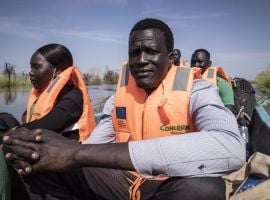
Knowledge Hub
Evidence-based learning, evaluations, research, guidance, manuals, tools and programme updates.
A review of community-centred early warning early action systems
Related:
Not all emergencies happen quickly. Some food crises, like those related to drought or conflict for example, take hold over time.

20-year-old Fatuma Mohamed and husband Abdulahi Osman (25) with their two boys - Yusuf, who is only three-and-a-half weeks old, and Mohamed (2½). Photographer: Peter Caton
We know that, if we can respond quickly enough to the threat of a growing crisis, we stand a better chance of preventing it escalating into a disaster and reducing the impact on the people affected if it does. Unfortunately, although we often know that these crises are developing, resources are still only mobilised too late.
We’ve produced this research to look at how the barriers to early action can be overcome, and how that action can better meet the needs of the people affected.





